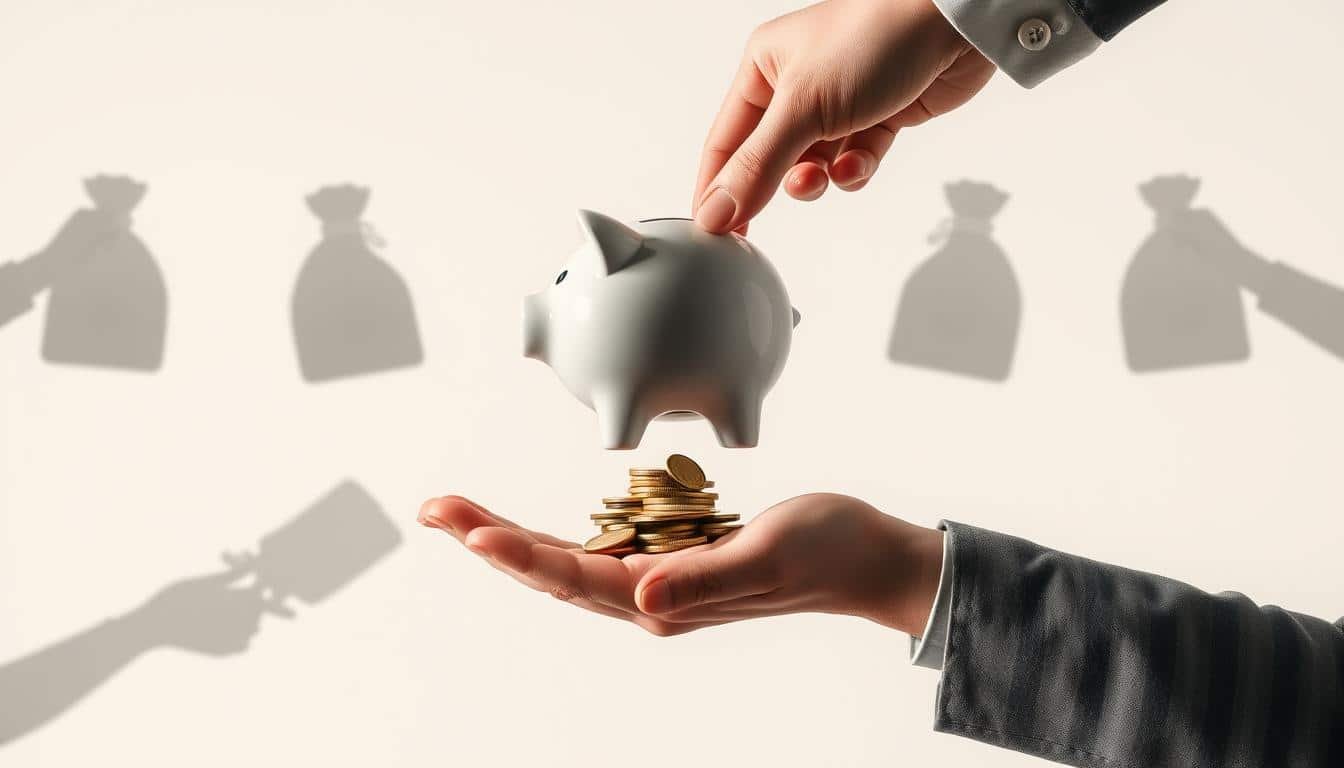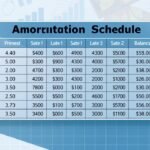Getting a loan without collateral is a common way for people to get money. It’s called an unsecured loan. Unlike secured loans, where you need to offer something valuable as collateral, unsecured loans focus on your credit score and financial health. This makes them a good option for many because you don’t risk losing something valuable.
Key Takeaways
- Unsecured loans do not require collateral, making them accessible to those without significant assets.
- Approval for an unsecured loan is based on your credit score, income, and overall financial profile.
- Unsecured loans can be used for a variety of purposes, including consolidating debt, financing a major purchase, or covering unexpected expenses.
- Unsecured loans typically carry higher interest rates compared to secured loans, as they pose a higher risk for lenders.
- Careful consideration of your financial situation and ability to repay the loan is crucial before taking out an unsecured loan.
What Is an Unsecured Loan?
An unsecured personal loan is a loan that doesn’t need collateral. Lenders look at your credit score and creditworthiness to approve these loans. This makes them riskier for lenders, so you usually need a good credit score to get one.
Definition and Key Takeaways
Unsecured loans are also called “signature loans” or “personal loans.” They don’t require property or assets as collateral. Getting these loans depends a lot on your credit score. You usually need a high credit score to get approved for unsecured loans.
How an Unsecured Loan Works
Unsecured loans are different from secured loans, where you use an asset as collateral. Since unsecured loans don’t have collateral, they’re riskier for lenders. This means they often have higher interest rates.
If you can’t pay back a secured loan, the lender can take your asset. But if you default on an unsecured loan, the lender can’t take your property. They might use a collection agency or sue you instead.
Credit cards, student loans, and personal loans are all unsecured loans. They’re given based on how creditworthy you are, not on collateral. But because they’re riskier for lenders, they often have higher interest rates and tough loan qualification rules.
Types of Unsecured Loans
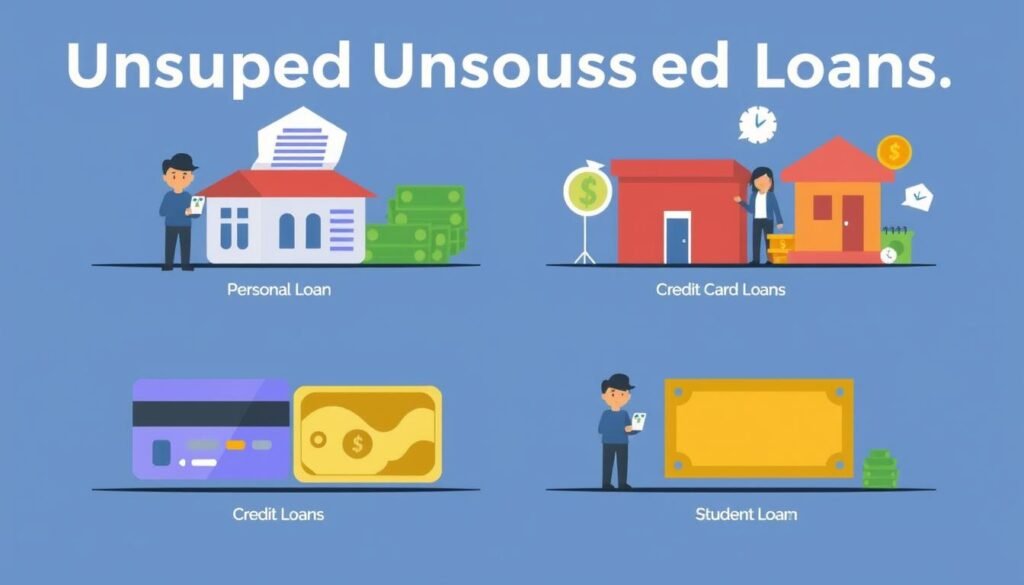
Unsecured loans have different forms, each meeting various financial needs. They include personal loans, student loans, and credit cards. These can be revolving or term loans.
Revolving loans let borrowers use a credit limit over and over. You can spend, repay, and use it again. Credit cards and personal lines of credit are examples. On the other hand, term loans need regular payments over a set time until paid off.
Term loans are often linked with secured loans like mortgages or auto loans. Yet, there are unsecured term loans too. These are for debt consolidation or signature loans from banks.
Examples
| Loan Type | Secured or Unsecured | Loan Structure | |
|---|---|---|---|
| Personal Loans | Unsecured | Revolving or Term | Signature loans, debt consolidation loans |
| Student Loans | Unsecured | Term | Federal student loans, private student loans |
| Credit Cards | Unsecured | Revolving | Visa, Mastercard, American Express |
Unsecured loans give borrowers the chance to get funds without collateral. This is great for those without assets to use as security.
Unsecured Loan vs. Payday Loan
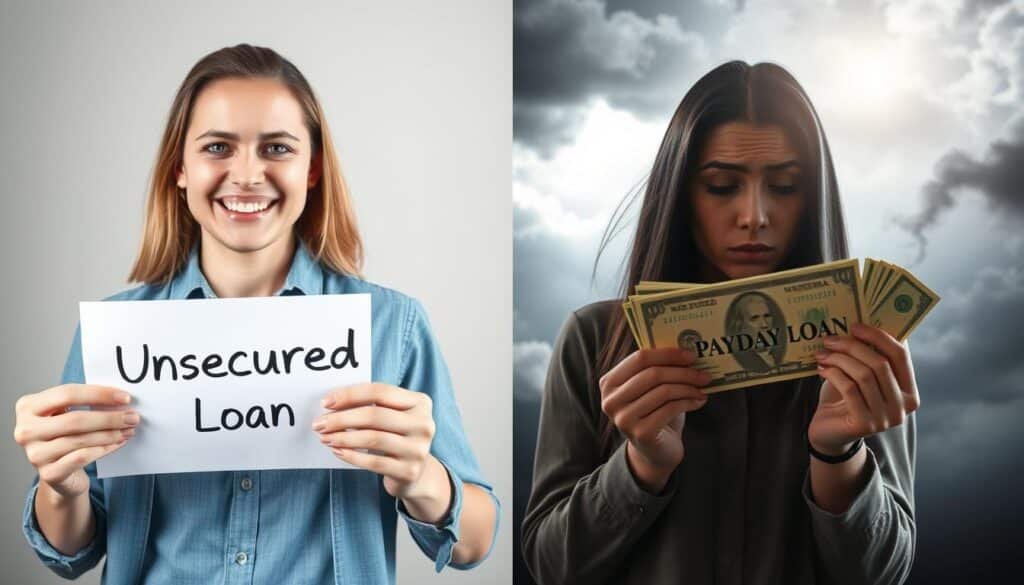
When you borrow money without giving up something valuable, you have two main options: unsecured loans and payday loans. Both are unsecured, but they’re very different.
Unsecured loans, like personal loans, come from banks, credit unions, or other lenders. They look at your credit to decide if you can get a loan. Payday loans, on the other hand, are known for their high-interest rates and tough terms.
Payday loans don’t need collateral like other loans. Instead, you might give the lender a check you’ll pay later or let them take money from your bank account. This makes payday loans different from regular unsecured loans.
The Equal Credit Opportunity Act (ECOA) stops lenders from using race, color, sex, or religion to decide on loans. This rule helps prevent discriminatory lending practices for both unsecured loans and payday loans. It makes sure everyone has a fair chance to get credit.
“The key difference between unsecured loans and payday loans is the level of risk and the terms associated with each type of financing.”
Special Considerations for Loan Without Collateral
Getting a loan without collateral has its own set of challenges, especially with discrimination. In the U.S., lending has become more fair, but discrimination still happens. The Equal Credit Opportunity Act (ECOA) helps protect people from being denied credit or getting bad terms because of their race, color, religion, national origin, sex, marital status, or age.
In 2020, the Consumer Financial Protection Bureau (CFPB) asked for public comments to improve the ECOA. Kathleen L. Kraninger, the CFPB director at the time, said, “Clear standards help protect African Americans and other minorities, but the CFPB must back them up with action to make sure lenders and others follow the law.”
“Clear standards help protect African Americans and other minorities, but the CFPB must back them up with action to make sure lenders and others follow the law.”
If you’re looking for a loan without collateral, know your rights under the ECOA. Watch for any signs of discrimination when applying. If you see discrimination, report it to the CFPB to help everyone get equal credit chances.
| Legislation | Purpose |
|---|---|
| Equal Credit Opportunity Act (ECOA) | Prohibits discrimination in credit transactions based on race, color, religion, national origin, sex, marital status, or age. |
| Consumer Financial Protection Bureau (CFPB) | Supervises compliance and enforces the ECOA to ensure nondiscriminatory access to credit. |
Best Unsecured Personal Loans in 2024

Getting a personal loan without needing collateral is a great choice for many. Top lenders offer good rates, flexible terms, and special perks. Let’s look at some top unsecured personal loan providers for 2024.
Top Lenders Offering Loans Without Collateral
LightStream is great for those with good credit, offering no fees and low rates depending on the loan’s purpose. SoFi gives perks like job loss protection and free financial advice to qualified borrowers. Achieve personal loans are ideal for fair- or good-credit borrowers who can get a rate discount.
Discover personal loans are great for those with good to excellent credit, with competitive rates and no fees. Happy Money is a smart choice for consolidating high-interest credit card debt if you get a low rate. Upstart offers quick funding and is an option for those with low credit scores or thin credit histories.
Prosper welcomes borrowers with various credit levels, offering competitive rates and fees, and instant approval. Best Egg is a good choice for those needing a secured loan or debt consolidation, but remember, there’s an origination fee. LendingClub is a solid choice for good-credit borrowers wanting to consolidate debt and improve their credit. Upgrade offers rate discounts and direct payment to creditors, with a low credit score requirement.
How to Qualify for a Loan Without Collateral
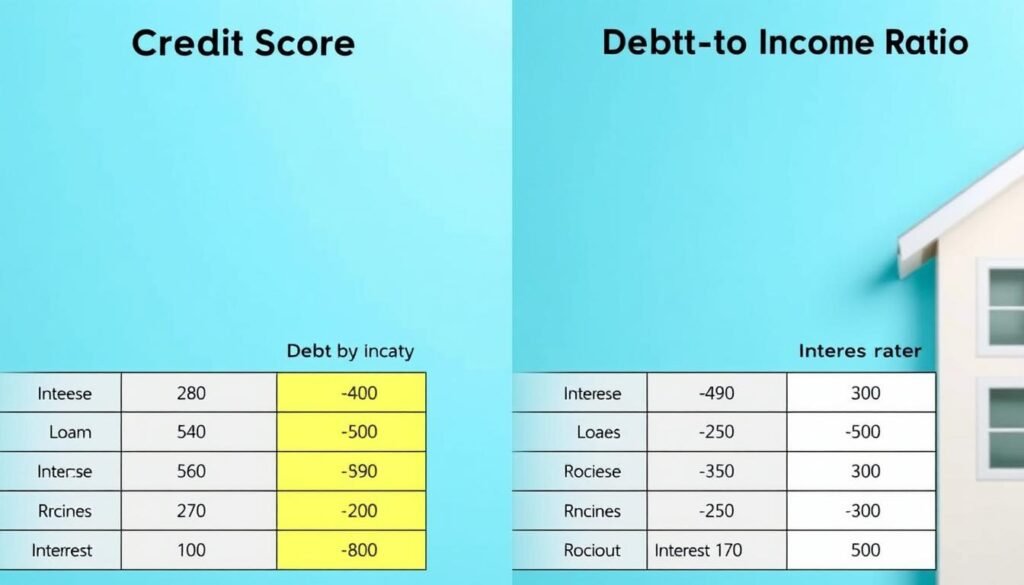
Getting a loan without collateral is possible for those with few assets or who need flexible financing. Lenders look at several important factors to see if you qualify and what the loan terms will be. Let’s look at the main things they check.
Credit Score Requirements
Your credit score is key when applying for an unsecured personal loan. Lenders like borrowers with high credit scores because it means they’re less likely to not pay back the loan. People with credit scores of 700 or higher usually get the best rates and can borrow more money.
But, if your credit score is low, you might still get a loan. You might just pay higher interest rates and borrow less money.
Debt-to-Income Ratio
Lenders also look at your debt-to-income (DTI) ratio. This ratio compares your monthly debt payments to your monthly income. Most lenders want a DTI below 50%. This shows you can handle more debt without getting overwhelmed.
A lower DTI means you’re more likely to be able to pay back the loan. This makes you a stronger candidate for a loan without collateral.
Lenders also look at your income, job history, and creditworthiness. They want to see if you can really pay back the loan. Knowing these factors can help you qualify for a loan without collateral and get the financing you need.
Pros and Cons of Unsecured Loans
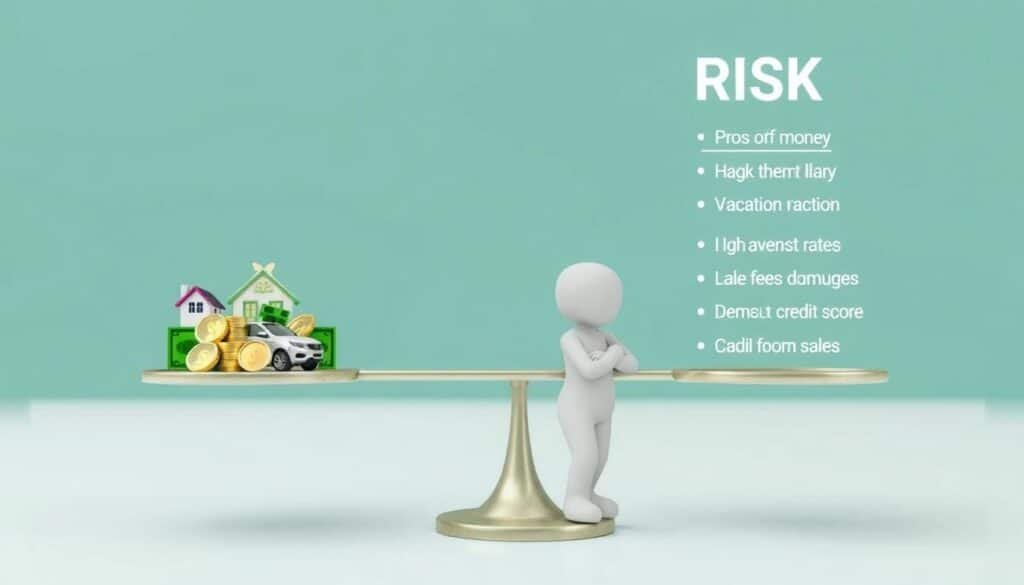
Unsecured loans can be a handy way to get money, but knowing the good and bad sides is key. Let’s look at the benefits and downsides of loans without collateral.
Pros of Unsecured Loans
- Faster Approval Process: Unsecured loans are often approved quicker than secured loans, which need collateral.
- No Risk of Losing Collateral: Since unsecured loans don’t ask for collateral, you won’t lose your property if you can’t pay back the loan.
Cons of Unsecured Loans
- Higher Interest Rates: Unsecured loans usually have higher interest rates than secured loans. This is because the lender takes more risk without collateral.
- Potential Impact on Credit Score: If you can’t pay back an unsecured loan, it can really hurt your credit score. This makes getting future loans harder.
- Debt Collection and Lawsuits: If you default, lenders might try to collect the debt or even sue you to get the money back.
| Pros | Cons |
|---|---|
| Faster Approval Process | Higher Interest Rates |
| No Risk of Losing Collateral | Potential Impact on Credit Score |
| Debt Collection and Lawsuits |
“The key to successfully navigating an unsecured loan is to carefully weigh the benefits against the risks and ensure you have a well-thought-out plan for repayment.”
Unsecured loans can be a good choice, but borrowers should think about their finances and the risks before agreeing to one.
Where to Get a Loan Without Collateral
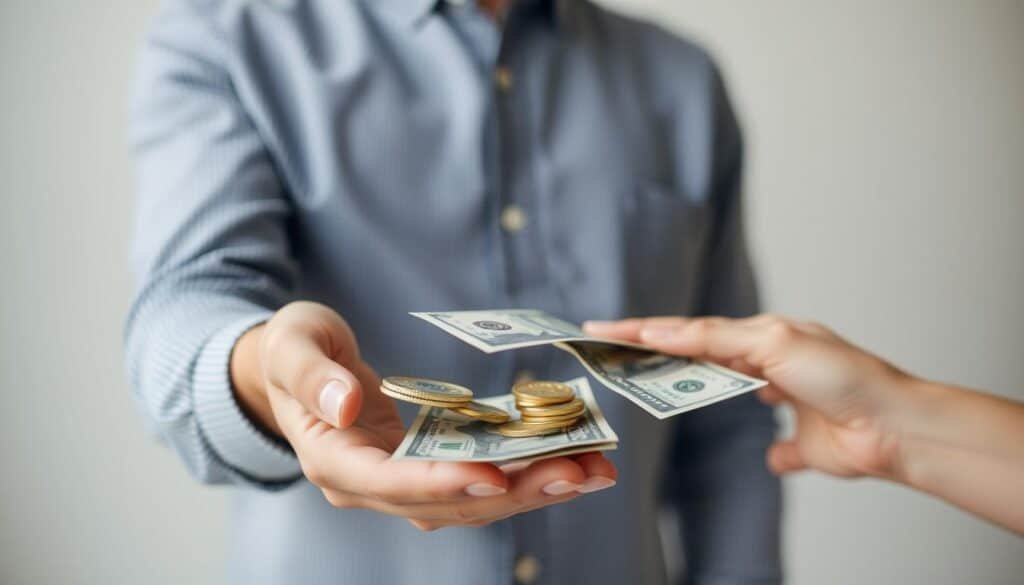
Getting a loan without collateral is possible for those without assets to secure it with. Luckily, many lenders offer unsecured personal loans. These include online lenders, credit unions, and traditional banks.
Online Lenders
Online lenders are a top choice for those needing loans without collateral. They work with various credit scores and offer fast decisions, usually within minutes. Plus, they can deposit money quickly, which is great for urgent cash needs.
Credit Unions
Credit unions could be another way to get a loan without collateral. They might have better rates and terms for those with less-than-perfect credit. But, you must join the credit union first to apply for a loan.
Banks
If you’re already a bank customer, check if they offer unsecured personal loans. Banks might give you bigger loans and lower rates if you’re a good customer. This is especially true if you have a strong credit history and financial stability.
Lenders, whether online, credit unions, or banks, let you pre-qualify for a loan without a hard credit check. This soft check won’t affect your credit score. It helps you compare offers and pick the best one for you.
How to Apply for an Unsecured Personal Loan

Applying for an unsecured personal loan is easy if you’re prepared. First, check your credit report for errors that could lower your score. Fix any mistakes before moving on.
After fixing any credit issues, start pre-qualifying with several lenders. This lets you see what loan offers you might get without hurting your credit score. Look over these offers to find the best one, then apply with your chosen lender.
When applying, you’ll need to provide documents like pay stubs, tax returns, and bank statements. This is part of the formal application process.
- Check your credit report and address any errors.
- Pre-qualify with multiple lenders to compare loan offers.
- Submit a formal application with the selected lender.
- Provide the required documentation, such as W-2s and bank statements.
The lender will do a hard credit check when you apply, but you’ll know within a few days if you’re approved. If yes, you could get your loan funded in about a week. This means you’ll have the money you need for your unsecured loan.
“Applying for an unsecured personal loan is a straightforward process, but it’s important to prepare properly to ensure you get the best possible terms.”
What Happens If You Default on a Loan Without Collateral?

Defaulting on an unsecured loan, like a personal loan without collateral, can lead to serious issues. The first hit will be on your credit score. Missing a payment by more than 30 days can lower your score by about 100 points. This drop can stay on your credit report for up to seven years.
If you keep missing payments, the lender might take steps to get back what you owe. They could sell your debt to a debt collection company. This company will then try to get you to pay what you owe. In some cases, the lender might even sue you for nonpayment. This could lead to wage garnishment or a property lien on your assets.
Defaulting on an unsecured loan can affect your finances for a long time. It’s important to know the risks and how to avoid them. You can do this by paying your loan on time, talking to your lender if you’re having trouble, and looking into other options like debt consolidation or payment plans.
| Consequence | Description |
|---|---|
| Impact on credit score | A missed payment can drop your score by around 100 points and remain on your report for up to 7 years. |
| Debt collection | The lender may sell your debt to a third-party company, which can then pursue you for the unpaid balance. |
| Wage garnishment | If the lender sues you for nonpayment, they may be able to garnish your wages to recover the debt. |
| Property lien | The lender may place a lien on your property to recoup the outstanding amount owed. |
Defaulting on an unsecured loan can lead to big problems. These include a big impact on your credit score and aggressive debt collection actions. This can include wage garnishment and property liens. It’s important to know these risks and act early to avoid defaulting on your loan.
Also Read : Insurance and Loan Considerations for Electric Vehicle Owners
Conclusion
Unsecured personal loans are a flexible way to borrow money without needing collateral. But, they have higher interest rates and more risk for lenders.
Before getting an unsecured loan, check your finances and see if you can pay back the debt. Know the loan process and what happens if you can’t pay it back. By looking at the pros and cons, picking the right lender, and choosing good loan terms, an unsecured loan can help you reach your financial goals.
An unsecured loan can be a good choice if you do your homework and plan well. It’s important to make smart choices and handle the risks. With careful planning, you can use an unsecured loan to meet your financial needs.
FAQs
Q: Can I get a loan without collateral?
A: Yes, you can get a loan without collateral, often referred to as an unsecured loan. These loans do not require you to secure the loan with assets, but they may come with higher interest rates.
Q: What are the interest rates for no-collateral loans?
A: Interest rates for no-collateral loans can vary significantly based on the lender, your credit score, and other factors. Generally, they are higher compared to secured loans due to the increased risk for lenders.
Q: How can I qualify for an unsecured business loan?
A: To qualify for an unsecured business loan, you typically need to demonstrate good or excellent credit, provide a solid business plan, and show that your business can generate enough revenue to cover the loan payments.
Q: Are there loan options for small business owners with bad credit?
A: Yes, there are loan options available for small business owners with bad credit, including no-collateral loans and alternative financing options. However, the terms and interest rates may not be as favorable.
Q: What is the fastest way to get an unsecured loan?
A: The fastest way to get an unsecured loan is to apply with online lenders that offer quick approval processes and fast funding, often allowing you to receive loan proceeds as soon as the next business day.
Q: What is a business line of credit, and does it require collateral?
A: A business line of credit is a flexible financing option that allows you to borrow funds up to a certain limit. Some lines of credit are unsecured, meaning they do not require collateral, while others may be secured.
Q: Can I secure a loan with lower credit scores?
A: It is more challenging to secure a loan with lower credit scores, especially for unsecured loans, but some lenders may still offer options. You may need to provide additional documentation or agree to higher interest rates.
Q: What are the typical loan amounts for unsecured personal loans?
A: Unsecured personal loans typically range from a few thousand dollars up to $50,000 or more, depending on the lender, your creditworthiness, and the loan purpose.
Q: Do personal loans require collateral?
A: Most personal loans are unsecured and do not require collateral. However, some lenders may offer secured personal loans with lower interest rates for those who want to secure the loan with assets.
Source Links
- https://www.investopedia.com/terms/u/unsecuredloan.asp
- https://www.nerdwallet.com/article/loans/personal-loans/unsecured-personal-loans-no-collateral
- https://www.nerdwallet.com/best/loans/personal-loans/unsecured-loans
